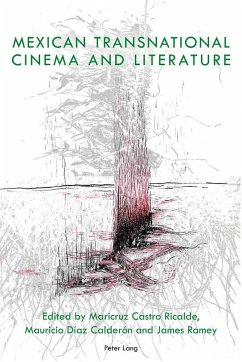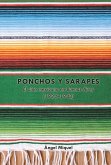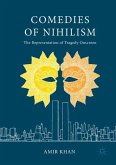"It was a great night for Mexico, as usual." Donald Trump's words about Alejandro González Iñárritu on Oscars' night 2014 were a preview of his now-notorious attitude toward Mexicans: "He's walking away with all the gold? Was it that good? I don't hear that. It was certainly a big night for them." Although the future president's comments were offensive, for scholars interested in transnational film and literature his words were pure gold, for they raise questions about "nation" as a category of representation. When we invoke "Mexican cinema," we imply that some kind of "national cinema" exists - but what is a national cinema? Is the cinema made in the US a national cinema in the same way as that of Mexico's? And is a film made by a foreigner in Mexico part of Mexican cinema? What does it mean for a film or a literary work to cross a border? And are borders to be defined in geographical terms only, or can they also be cast in terms of gender, sexual orientation, race, or language itself? This book, in short, reflects on the implications of the term transnational in relation to film and literature conceived - in any way, shape, or form - as "Mexican."
"Si le interesan las relaciones entre México y el norte, este libro puede ser un buen principio; si además gusta usted del cine y la literatura, Mexican Transnational Cinema and Literature se convierte en un libro de lectura necesaria."
-Tania Ruiz Ojeda, Inflexiones, 2018
"El tomo reúne a investigadores con distinta trayectoria y perfiles y, sin embargo, logra crear un ágora donde la discusión y argumentación es de muy buena factura. Ellos y ellas son, como las obras que estudian, producto de fecundos cruces de tradiciones académicas transnacionales. Finalmente, Mexican Transnational Cinema and Literature es ya un referente en los estudios cinematográficos y literarios que abordan la identidad, las nociones de lo nacional frente a lo transnacional, y de las hibridaciones entre géneros y disciplinas."
-Ulises Bonifacio Zarazúa Villaseñor, EL OJO QUE PIENSA, No. 17, July-Dec. 2018
"En resumidas cuentas, este volumen, sin proponer una respuesta definitiva a lo que significa ser mexicano en el cine y la literatura de los siglos XX y XXI, rompe de manera inteligente con las ideas preconcebidas sobre la mexicanidad y abre paso a una redefinición más dinámica de la nación y de la identidad, teniendo en cuenta las complejas relaciones fronterizas y las cuestiones migratorias. A pesar de la diversidad de autores y de objetos artísticos estudiados, las reflexiones que nacen de los capítulos dialogan entre sí con fluidez; la reunión de las diecisiete contribuciones resulta entonces fructífera y permite una comprensión diacrónica y más profunda de las interrelaciones entre cine, literatura y construcción de la nación. [...] En un contexto político en el que se cuestiona la colaboración intercontinental americana, los editores han apostado, con este primer volumen de la serie sobre cine y literatura transamericanos, por una reafirmación de la importancia del proyecto cultural cinematográfico y literario americano. Y su propuesta resulta más que convincente."
-Gabrielle Pannetier Leboeuf, Bulletin hispanique, 120-2, 2018
"Se trata de temas y problemáticas de candente actualidad, que nos invitan a mirar hacia atrás para comprender nuestro hoy, pero también para entrever nuestro mañana."
-Raquel Gutiérrez Estupiñán, La Colmena, Oct.-Dec. 2018
"[T]hese essays shed new light on particular works, movements, and figures in Mexican literature and film in ways that allow us to reconsider Mexico's current place in film, literature, and global geopolitics."
-Stephanie Pridgeon, Chasqui, 2019
"Todos los textos, ejecutados por investigadores con distintos perfiles e intereses, ofrecen novedosos mecanismos teóricos que permiten repensar las relaciones de otredad, alteridad e identidad en el ámbito de lo transnacional desde la naturaleza del cine y la literatura. [...] El libro Mexican Transnational Cinema and Literature resulta de una gran pertinencia teórica y temática para intentar comprender la complejidad política, social y artística que condiciona el estado actual de nuestro mundo." -Julio Ortega Jiménez, Literatura Mexicana, Vol. 30, No. 2, 2019, pp. 185-189
"It is often said that Mexican cinema is currently enjoying a second 'Época de Oro,' but after reading this fine collection of essays, its intended audience-undergraduate and graduate students, as well as professors-might find the adjective 'Mexican' rather odd when referring to film or literature. In Mexican Transnational Cinema and Literature, the concept becomes slippery and hard to pin down; it disrupts the linkage between nation and identity, unsettles its fixity and liquefies the solid ground on which it previously stood. [...] Its publication is timely given the present backlash against globalization and the rise of neo-nationalist politics in many countries around the world, which calls for the highlighting of national borders and identities. The book persuasively argues that such nostalgia for the illusionary borders of nationalism in film and literature will come to naught."
-Álvaro Ramírez, Hispania, Vol. 102, No. 2, June 2019, pp. 276-277
"By publishing with a European press, this publication ensures a wider readership outside of Mexico for the majority Mexican-based researchers in this collection. In itself, that is welcome, and because the chapters are significant interventions by leading scholars, covering a range of periods and material, it is an important contributino to the field that should extend the dialogue across borders." -Niamh Thornton, Studies in Spanish and Latin American Cinemas, Vol. 16, No. 3, 2019
-Tania Ruiz Ojeda, Inflexiones, 2018
"El tomo reúne a investigadores con distinta trayectoria y perfiles y, sin embargo, logra crear un ágora donde la discusión y argumentación es de muy buena factura. Ellos y ellas son, como las obras que estudian, producto de fecundos cruces de tradiciones académicas transnacionales. Finalmente, Mexican Transnational Cinema and Literature es ya un referente en los estudios cinematográficos y literarios que abordan la identidad, las nociones de lo nacional frente a lo transnacional, y de las hibridaciones entre géneros y disciplinas."
-Ulises Bonifacio Zarazúa Villaseñor, EL OJO QUE PIENSA, No. 17, July-Dec. 2018
"En resumidas cuentas, este volumen, sin proponer una respuesta definitiva a lo que significa ser mexicano en el cine y la literatura de los siglos XX y XXI, rompe de manera inteligente con las ideas preconcebidas sobre la mexicanidad y abre paso a una redefinición más dinámica de la nación y de la identidad, teniendo en cuenta las complejas relaciones fronterizas y las cuestiones migratorias. A pesar de la diversidad de autores y de objetos artísticos estudiados, las reflexiones que nacen de los capítulos dialogan entre sí con fluidez; la reunión de las diecisiete contribuciones resulta entonces fructífera y permite una comprensión diacrónica y más profunda de las interrelaciones entre cine, literatura y construcción de la nación. [...] En un contexto político en el que se cuestiona la colaboración intercontinental americana, los editores han apostado, con este primer volumen de la serie sobre cine y literatura transamericanos, por una reafirmación de la importancia del proyecto cultural cinematográfico y literario americano. Y su propuesta resulta más que convincente."
-Gabrielle Pannetier Leboeuf, Bulletin hispanique, 120-2, 2018
"Se trata de temas y problemáticas de candente actualidad, que nos invitan a mirar hacia atrás para comprender nuestro hoy, pero también para entrever nuestro mañana."
-Raquel Gutiérrez Estupiñán, La Colmena, Oct.-Dec. 2018
"[T]hese essays shed new light on particular works, movements, and figures in Mexican literature and film in ways that allow us to reconsider Mexico's current place in film, literature, and global geopolitics."
-Stephanie Pridgeon, Chasqui, 2019
"Todos los textos, ejecutados por investigadores con distintos perfiles e intereses, ofrecen novedosos mecanismos teóricos que permiten repensar las relaciones de otredad, alteridad e identidad en el ámbito de lo transnacional desde la naturaleza del cine y la literatura. [...] El libro Mexican Transnational Cinema and Literature resulta de una gran pertinencia teórica y temática para intentar comprender la complejidad política, social y artística que condiciona el estado actual de nuestro mundo." -Julio Ortega Jiménez, Literatura Mexicana, Vol. 30, No. 2, 2019, pp. 185-189
"It is often said that Mexican cinema is currently enjoying a second 'Época de Oro,' but after reading this fine collection of essays, its intended audience-undergraduate and graduate students, as well as professors-might find the adjective 'Mexican' rather odd when referring to film or literature. In Mexican Transnational Cinema and Literature, the concept becomes slippery and hard to pin down; it disrupts the linkage between nation and identity, unsettles its fixity and liquefies the solid ground on which it previously stood. [...] Its publication is timely given the present backlash against globalization and the rise of neo-nationalist politics in many countries around the world, which calls for the highlighting of national borders and identities. The book persuasively argues that such nostalgia for the illusionary borders of nationalism in film and literature will come to naught."
-Álvaro Ramírez, Hispania, Vol. 102, No. 2, June 2019, pp. 276-277
"By publishing with a European press, this publication ensures a wider readership outside of Mexico for the majority Mexican-based researchers in this collection. In itself, that is welcome, and because the chapters are significant interventions by leading scholars, covering a range of periods and material, it is an important contributino to the field that should extend the dialogue across borders." -Niamh Thornton, Studies in Spanish and Latin American Cinemas, Vol. 16, No. 3, 2019








